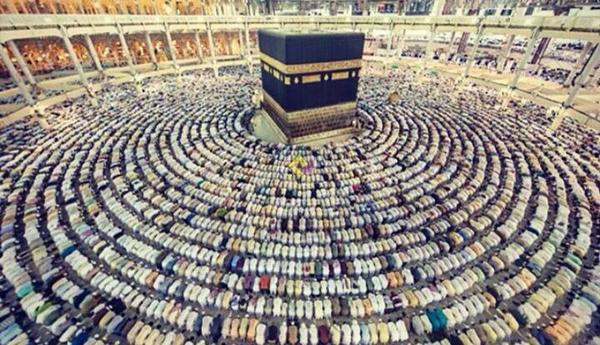Can I Perform Multiple Umrahs?
Hanafi Fiqh
Answered by Shaykh Umer Mian
Question: Assalamu alaykum
I intend on performing my umrah soon. Can I perform multiple umrahs there?
How should I do this?
Answer: Wa alaikum as-salam wa rahmatullahi wa barakatuhu
Short answer:
Yes, you can perform as many umrahs as you wish. While in Makkah, perform additional umrahs by first going to Masjid Aisha (may Allah be pleased with her) and entering the state of ihram from there. Then, complete the umrah as normal (tawaf, sa’ee between Safa and Marwa, and shaving/shortening hair).
Detailed answer:
Yes, you can perform umrah as many times as you’d like. This means you can travel to Makkah and perform a first umrah, and then perform additional umrahs during your stay in Makkah. For the initial umrah, you are traveling to Makkah coming from outside the legal boundary marked by the Sacred Law (miqat). In this case, you must enter the state of ihram before passing this legal boundary (miqat). Keep in mind that the city of Jeddah is within the miqat. Hence, those who will be landing at Jeddah airport with the intention of Hajj or Umrah must enter ihram either a) before boarding the plane, or b) inside the plane before the plane flies over the miqat (often times the pilot will announce this point).
After coming to Makkah and performing the initial umrah, you will now be considered like the people of Makkah (for the purposes of ihram ruling). That means if you wish to perform another umrah during your stay, you need to go outside the haram of Makkah and enter the state of ihram from there. Be aware that the haram of Makkah (الحَرَم المكّي) is not the same as the al-Masjid al-Haram. The haram of Makkah refers to the area around Makkah that is deemed sacred land in Islam. It extends for several miles in all directions around Makkah, and its limits are marked by signs placed on major roads. Masjid A’isha (may Allah be pleased with her), which is also known as Masjid Tan’eem or Masjid Umrah, is one location outside the haram of Makkah from which it is permissible to enter ihram for your additional umrahs. Although Masjid A’isha is preferred, going to any location outside the haram of Makkah would suffice.
(الدر المختار) الْمِيقَاتُ ( لِمَنْ بِمَكَّةَ ) يَعْنِي مَنْ بِدَاخِلِ الْحَرَمِ ( لِلْحَجِّ الْحَرَمُ وَلِلْعُمْرَةِ الْحِلُّ ) لِيَتَحَقَّقَ نَوْعُ سَفَرٍ وَالتَّنْعِيمُ أَفْضَلُ
It is stated in al-Durr al-Mukhtar, an authoritative reference of Sacred Law according to the Hanafi school:
“For anyone inside the haram of Makkah, the miqat (legal boundary for ihram of Hajj or Umrah) is to go outside the haram of Makkah (what’s referred to as ‘Al-Hill’). By doing so, one achieves some form for travel (fulfilling the travel requirement of Hajj/Umrah). The best place to do this is al-Tan’eem (now known as Masjid A’isha).”
Regarding the umrah of the Messenger of Allah (peace and blessings of Allah be upon him), it is reported in a hadith narrated by Anas (may Allah be pleased with him) that the Messenger of Allah (peace and blessings of Allah be upon him) made umrah a total of four times (see Kitab al-Hajj from Sahih al-Bukhari and Sahih Muslim), each one in a different year. However, this in no way prohibits one from performance of multiple umrahs on one trip, as it falls under the general permissibility indicated by the following textual evidences:
إِنَّ الصَّفَا وَالْمَرْوَةَ مِنْ شَعَائِرِ اللَّهِ فَمَنْ حَجَّ الْبَيْتَ أَوِ اعْتَمَرَ فَلَا جُنَاحَ عَلَيْهِ أَنْ يَطَّوَّفَ بِهِمَا وَمَنْ تَطَوَّعَ خَيْرًا فَإِنَّ اللَّهَ شَاكِرٌ عَلِيمٌ (البقرة 158)
Behold! Safa and Marwa are among the Symbols of Allah. So if those who visit the House in the Season or at other times, should compass them round, it is no sin in them. And if any one obeyeth his own impulse to good,- be sure that Allah is He Who recogniseth and knoweth (Qur’an 2:158).
عَنْ أَبِي هُرَيْرَةَ – رَضِيَ اللَّهُ عَنْهُ – قَالَ: قَالَ رَسُولُ اللَّهِ – صَلَّى اللَّهُ عَلَيْهِ وَسَلَّمَ : العمرة إلى العمرة كفارة لما بينهما (متّفق عليه)
Narrated by Abu Hurayrah (may Allah be pleased with him): the Messenger of Allah (peace and blessings of Allah be upon him) said: “(The performance of) Umrah is an expiation for the sins committed between it and the previous Umrah.” (Agreed upon by Bukhari and Muslim).
عَنْ أَبِي هُرَيْرَةَ – رَضِيَ اللَّهُ عَنْهُ – قَالَ: قَالَ رَسُولُ اللَّهِ – صَلَّى اللَّهُ عَلَيْهِ وَسَلَّمَ -: مَا يَزَالُ عَبْدِي يَتَقَرَّبُ إِلَيَّ بِالنَّوَافِلِ حَتَّى أُحِبَّهُ (رَوَاهُ الْبُخَارِيُّ)
Narrated by Abu Hurayrah (may Allah be pleased with him): the Messenger of Allah (peace and blessings of Allah be upon him) said: “(Allah says:) My servant continues to draw near to me with supererogatory acts of worship until I love him.” (Bukhari).
Wassalam,
[Shaykh] Umer Mian
